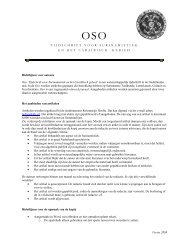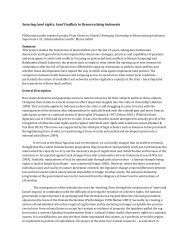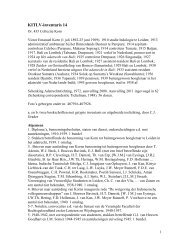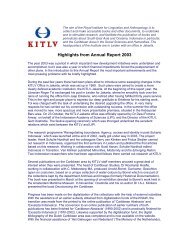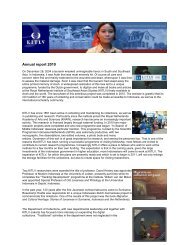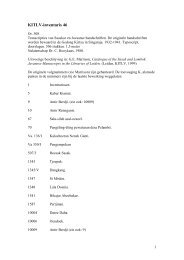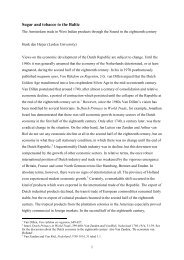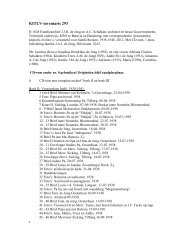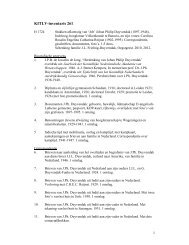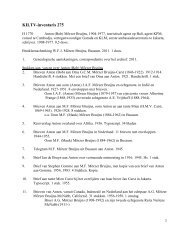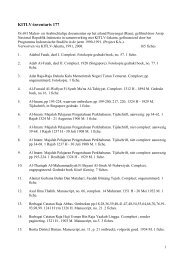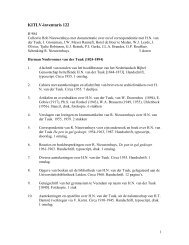indonesian economic decolonization in regional and ... - kitlv
indonesian economic decolonization in regional and ... - kitlv
indonesian economic decolonization in regional and ... - kitlv
Create successful ePaper yourself
Turn your PDF publications into a flip-book with our unique Google optimized e-Paper software.
Indonesian <strong>economic</strong> <strong>decolonization</strong> <strong>in</strong> <strong>regional</strong> <strong>and</strong> <strong>in</strong>ternational perspective 11<br />
Indonesia <strong>in</strong> 1956, more than 80 per cent of the debt had <strong>in</strong> fact been paid off<br />
(Dick et al. 2002:170-2).<br />
The po<strong>in</strong>t of departure <strong>in</strong> the contribution by Marks is whether<br />
Independence <strong>in</strong>deed formed a turn<strong>in</strong>g po<strong>in</strong>t <strong>in</strong> the long-term <strong>economic</strong><br />
growth performance of former colonies. He applies a three-layered analysis,<br />
consider<strong>in</strong>g respectively the relationship <strong>in</strong> general between <strong>decolonization</strong><br />
<strong>and</strong> <strong>economic</strong> growth, the experiences of selected former colonies <strong>in</strong> Asia <strong>and</strong><br />
developments <strong>in</strong> the <strong>in</strong>terisl<strong>and</strong> shipp<strong>in</strong>g <strong>in</strong>dustry <strong>in</strong> Indonesia shortly after<br />
Independence. He argues that Independence <strong>and</strong> <strong>decolonization</strong> had a direct<br />
positive impact on <strong>economic</strong> growth <strong>in</strong> India, Malaysia <strong>and</strong> the Philipp<strong>in</strong>es,<br />
whereas the first couple of decades immediately follow<strong>in</strong>g Independence <strong>in</strong><br />
Indonesia failed to produce a significant break with the growth record of the<br />
colonial period. Indonesia rema<strong>in</strong>s a ‘special case’, reaffirm<strong>in</strong>g the author’s<br />
hypothesis, derived from the <strong>in</strong>ternational literature, that <strong>decolonization</strong> <strong>and</strong><br />
rapid <strong>economic</strong> growth are only positively correlated to one another under<br />
specific circumstances.<br />
Economic disruption <strong>and</strong> political turmoil dur<strong>in</strong>g the Revolution <strong>and</strong> the<br />
late 1950s up to the establishment of the New Order government <strong>in</strong> the mid-<br />
1960s expla<strong>in</strong> why Indonesia became a ‘special case’ <strong>in</strong> the <strong>in</strong>ternational comparison<br />
carried out by Marks. He uses data concern<strong>in</strong>g the shipp<strong>in</strong>g concern<br />
KPM <strong>in</strong> the 1950s as evidence of the ‘<strong>in</strong>stitutional damage’ which precluded a<br />
positive correlation between <strong>decolonization</strong> <strong>and</strong> susta<strong>in</strong>ed <strong>economic</strong> growth.<br />
As a corollary, he ascribes the extreme predicament of the Indonesian economy<br />
<strong>in</strong> the mid-1960s to the preced<strong>in</strong>g disruption, <strong>in</strong>clud<strong>in</strong>g the expulsion of<br />
Dutch firms <strong>in</strong> the late 1950s. In do<strong>in</strong>g so, he presents an alternative view to<br />
the one argued by L<strong>in</strong>dblad <strong>in</strong> the same volume, which testifies to the scope<br />
for debate <strong>in</strong> historical discourse.<br />
The idea is common that the Dutch companies <strong>in</strong> Indonesia eng<strong>in</strong>eered<br />
their own demise by be<strong>in</strong>g so ill-prepared to ‘<strong>in</strong>digenize’ management <strong>and</strong><br />
respond adequately to the <strong>economic</strong> aspirations of the newly <strong>in</strong>dependent<br />
nation. This issue is taken up by Jasper van de Kerkhof, <strong>in</strong> his comparison<br />
of Dutch <strong>and</strong> British corporate strategies <strong>in</strong> Indonesia <strong>and</strong> Malaysia (British<br />
Malaya up to 1957). Neighbour<strong>in</strong>g Malaysia makes an <strong>in</strong>terest<strong>in</strong>g case for<br />
comparison, s<strong>in</strong>ce it is generally acknowledged that <strong>economic</strong> <strong>decolonization</strong><br />
there proceeded much more smoothly <strong>and</strong> less detrimental for post-colonial<br />
<strong>economic</strong> development. Van de Kerkhof’s f<strong>in</strong>d<strong>in</strong>gs show that great care<br />
should be taken when mak<strong>in</strong>g such generalizations. British firms <strong>in</strong> Malaysia<br />
were equally reluctant to vacate their privileged position <strong>and</strong> ‘<strong>in</strong>digenize’ top<br />
management.<br />
British <strong>and</strong> Dutch firms both took active steps to ‘<strong>in</strong>digenize’ the lower<br />
ranks of their corporation, but they found it equally difficult to appo<strong>in</strong>t<br />
well-educated <strong>and</strong> capable Malay <strong>and</strong> Indonesian managers <strong>in</strong>to the higher




